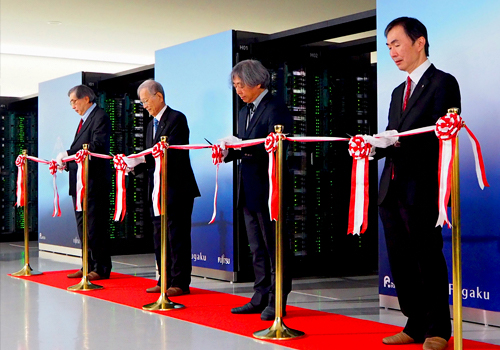On March 9, the development of the supercomputer Fugaku was completed, and shared use of the machine began. The computer, currently ranked as the most powerful in the world, was developed by RIKEN and Fujitsu starting in 2014, with the mission of becoming the core of Japan’s High Performance Computing Infrastructure, an initiative of the Ministry of Education, Culture, Sports, Science and Technology.

Trial use of the system began in April 2020, mainly on projects aiming to accelerate research results and projects aiming to combat the COVID-19 pandemic. The Research Organization for Information Science and Technology (RIST) has been charged with selecting projects based on applications to promote the wide use of the system. It recently selected 74 projects that will be implemented in FY2021, which begins in April 2021. In addition, RIST is calling for proposals in several categories, and researchers who are interested are invited to apply (https://www.hpci-office.jp/pages/e_fugaku_trial). For more information about Fugaku, please see the website of the RIKEN Center for Computational Science (https://www.r-ccs.riken.jp/en/).
Regarding the start of shared use, RIKEN President Hiroshi Matsumoto said, “This is just the beginning for Fugaku, and we are looking forward to seeing it truly demonstrate its tremendous potential. Above all, Fugaku is a key national technology, and we will manage it responsibly with the goal to achieve research results that will help build a long-lived and healthy society, disaster mitigation, and better energy use, with the ultimate goal to establish the government’s vision of an ultra-smart Society 5.0. In addition, we are aiming to provide researchers around the world with the best possible computing resources and usage environment.”
RIST President Yasuhide Tajima said, “The ultra-high-performance computer Fugaku is about to go into full-scale operation. I look forward to seeing this most powerful ‘external brain’ ever developed by humanity helping to expand our knowledge but enabling us to gain deeper insights into the foundation of matter in both time and space, giving us better structural and functional analysis of life, society, and industry, enabling more accurate predictions; and even designing the unknown future of humanity. RIST is committed to fulfilling its mission in maximizing the potential of the Fugaku facility while making it easy to use for a broad range of users.”
Fujitsu President and CEO Takahito Tokita added, “Fujitsu is humbled to have played an important role in the development of Fugaku from its earliest stages, and we are very pleased to celebrate this important milestone. As the first supercomputer to win four awards in key world rankings, Fugaku has demonstrated exceptional performance in areas including big data analysis and artificial intelligence, as well as simulations, which are the traditional forte of supercomputers. In addition to these technological achievements, it is also important that Fugaku has great potential to make the world more sustainable. I very much hope that as we mark the start of its shared use, Fugaku will serve as a platform that empowers researchers to innovate and create new value, generating results that lead to the solution of various social and environmental challenges confronting the world.”
According to RIKEN R-CCS Center Director Satoshi Matsuoka, “In the decade since its initial conception, the Fugaku project has brought together Japan’s top talent in the area of supercomputing from industry, government, and academia, and they have carried out research and development with the goal of achieving both world-class application-first performance and versatility over a wide range of applications. Thanks to these efforts, Japan is a world leader in IT technology, including in the development of the most advanced high-performance general-purpose CPUs, and we have already achieved a number of results in applied areas, such as the struggle against COVID-19. Our center will continue to conduct research and development to strengthen Fugaku and to advance the future of computation. Fugaku will certainly play an active role as a core infrastructure for the building of Society 5.0 and to contribute to further progress in science, technology, and innovation.”
This article was first published on 9 March by RIKEN.




 A unique international forum for public research organisations and companies to connect their external engagement with strategic interests around their R&D system.
A unique international forum for public research organisations and companies to connect their external engagement with strategic interests around their R&D system.